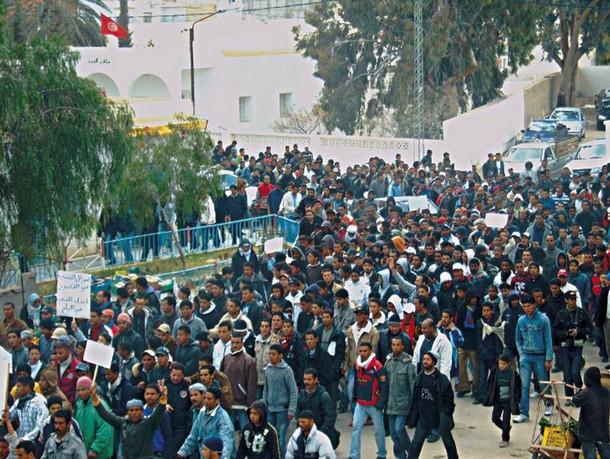Communist Workers’ Party of Tunisia
France: Jean-Luc Mélenchon on the Movement for the 6th Republic
The first of a three-part video (other parts below) features the address of Jean-Luc Mé
Tunisia: Activist leader assassinated as left re-unites to provide alternative

More than 1 million people mobilised to protest the assassination
Tunisia's 'unfinished revolution' -- interview with Workers' Party militant

By Peter Boyle
November 16, 2012 -- Green Left Weekly -- Abdel Jabbar Madouri (pictured above) has been a militant in Tunisia since his early secondary school days. He was jailed three times (in 1987,1993 and 2002) because of his political activism. After every arrest, he was tortured and then sentenced to more then 12 years in jail. Madouri spent four years in hiding during the Ben Ali regime. He was also deprived of the right to work or to obtain a passport.
Madouri is also novelist and member of the League of Free Writers and some of his novels were banned by the dictatorship. Today he is member of the national committee of the Tunisian Worker’s Party and is editor of its newspaper Sawt Echaab (People's Voice).
Green Left Weekly interviewed Madouri by internet with with the assistance of and translation from Arabic by Tunisian journalist Haithem Mahjoubi.
* * *

[The following interview with national co-convenor of Australia's Socialist Alliance
Tunisia: Left gains in trade union election

By Nizar Amami
Tunisia: Interview with Communist Workers' Party (PCOT) leaders

Ted Walker interviews Samir Taamallah, Chrif Khraief and Jilani Hamemi
November 26, 2011 -- Al-Thawra Eyewitness, posted at Links International Journal of Socialist Renewal with the author's permission -- I first met with Samir Taamallah, a former political prisoner and member of the central committee of the Communist Worker's Party of Tunisia (PCOT), in Tunis on October 4, 2011, to discuss the October 23 Constituent Assembly election and Tunisia's ongoing revolutionary struggle. The first part of the interview took place before the election. The follow-up interview part took place after the results were known.
* * *
How is the election campaign going?
Arab Spring eyewitness: Reflections on the revolutions in Egypt and Tunisia

[The writer is an Australian Socialist
Tunisia: Communist Workers Party holds first legal congress in 25 years
By Kal

Mass protests in Tunisia, January 2011.
By the Communist Workers' Party of Tunisia/Parti communiste des ouvriers de Tunisie (PCOT)
Translated by John Catalinotto for Tlaxcala
Two and a half months have passed since the glorious revolution of January 14. During this period, the people have made significant progress through their struggle and sacrifice.
Communist Workers' Party of Tunisia opposes Libya intervention, calls for completion of revolution

The Communist Workers' Party of Tunisia on Libya: "The Tunisian revolution has spread to many Arab countries. Egypt's dictator fell, while authoritarian regimes in Yemen and Bahrain are fiercely repressing popular uprisings, in Bahrain, with the help of Saudi Arabia. Our neighbour, the Libyan people, rose up against their tormentors, but events took a bad turn with the intervention of the United States and its allies, under the pretext of protecting civilians. The US administration has hardly mentioned the killing of civilians in Yemen and Bahrain, as it has also never done regarding Gaza, Lebanon or Iraq and Afghanistan, countries it occupies. And didn’t Sarkozy support the Tunisian dictator until the last moment?
Tunisia: 14th January Front proposes a National Congress for the Defence of the Revolution

By the 14th January Front*
February 14, 2011 -- The Tunisian revolution is the first of the 21st century. Its shock waves have shaken dictators and Western governments. But it has yet to overturn the ancien regime, and the neocolonial state apparatus that supports it. As an expression of popular unrest it has been fed by the anger of a diverse classes, at least until January 14, 2011. Since that date there has been increasing polarisation between the forces who back the revolution and those of the counterrevolution.
Those on the latter side are attempting to safeguard their constitution and its institutions. With the collaboration with liberal fringes of the democratic movement, Western agents, Islamists and the leftovers of the ancien regime, they are trying to stem the social movement. The provisional government of "national unity" is peopled by former members of Ben Ali’s power structure. This includes a prime minister (from 1999), Mohamed Ghannouchi, who was the architect of neoliberal policies dictated by imperialist financial bodies.
Túnez: 'Poder popular' destituye dictador
Domingo, 23 de Enero, 2011
Este artículo fue originalmente publicado en inglés a www.greenleft.org.au.
Por Tony Iltis, fue traducido por Sean Seymour-Jones
Después de 23 años de dominio dictatorial, el presidente tunecino Zine El Abidine Ben Ali fue forzado a dimitir y huir a Arabia Saudita el 14 de Enero debido a un levantamiento masivo.
El alzamiento comenzó en 17 de diciembre en el pueblo provincial de Sidi Bouzid con un acto de desesperación individual.
Mohammed Bouazizi, recién graduado que tenía 26 años y se ganaba la vida como un vendedor de frutas sin permiso de las autoridades. Después de ser abusado y humillado por la policía quien confiscó su carro de frutos, se roció con gasolina y se inmoló en frente de las oficinas del gobierno municipal.
Esta declaración extrema contra la pobreza, la falta de oportunidad y la brutalidad de estado fue el motor de las protestas que se extendieron a través del país, a pesar de que la policía disparaba a los manifestantes y aplicaba gas lacrimógeno.
Para el 27 de diciembre muchas protestas han estallado en la capital, Túnez. El joven Bouazizi murió de sus heridas el 4 de enero. Sin embargo, su protesta dramática ha impulsado un movimiento que a menos de un mes derrocó el régimen.